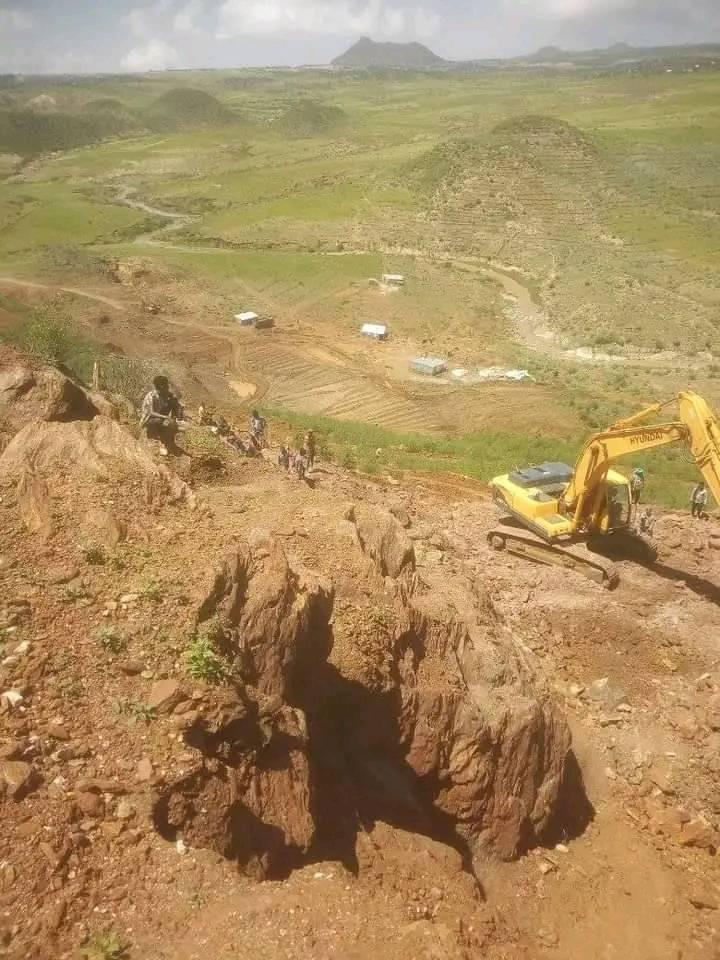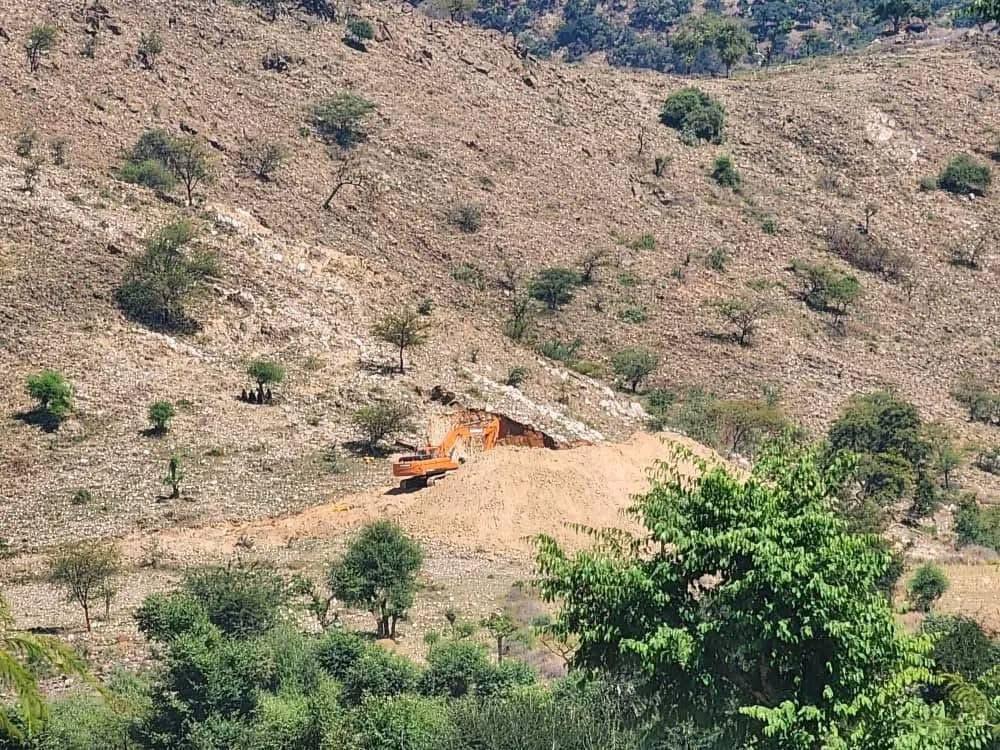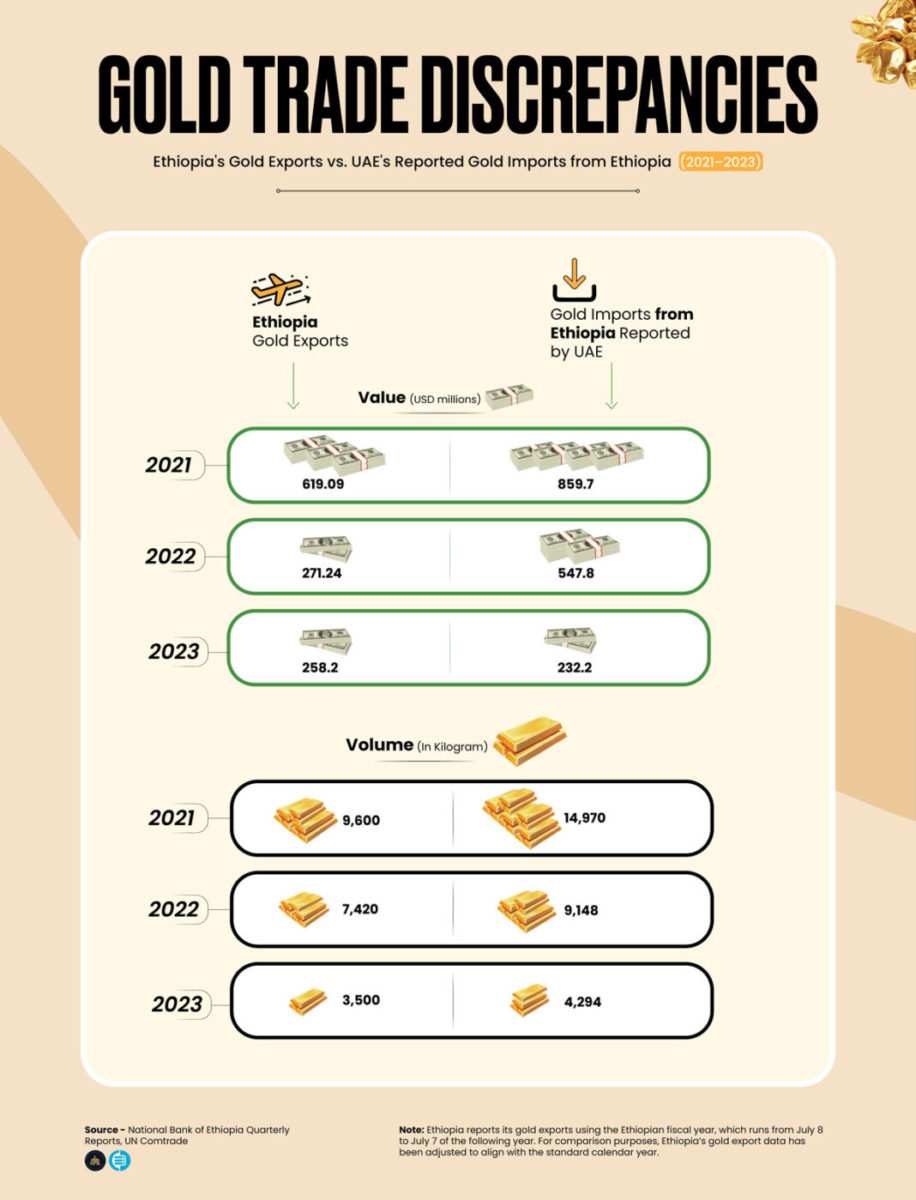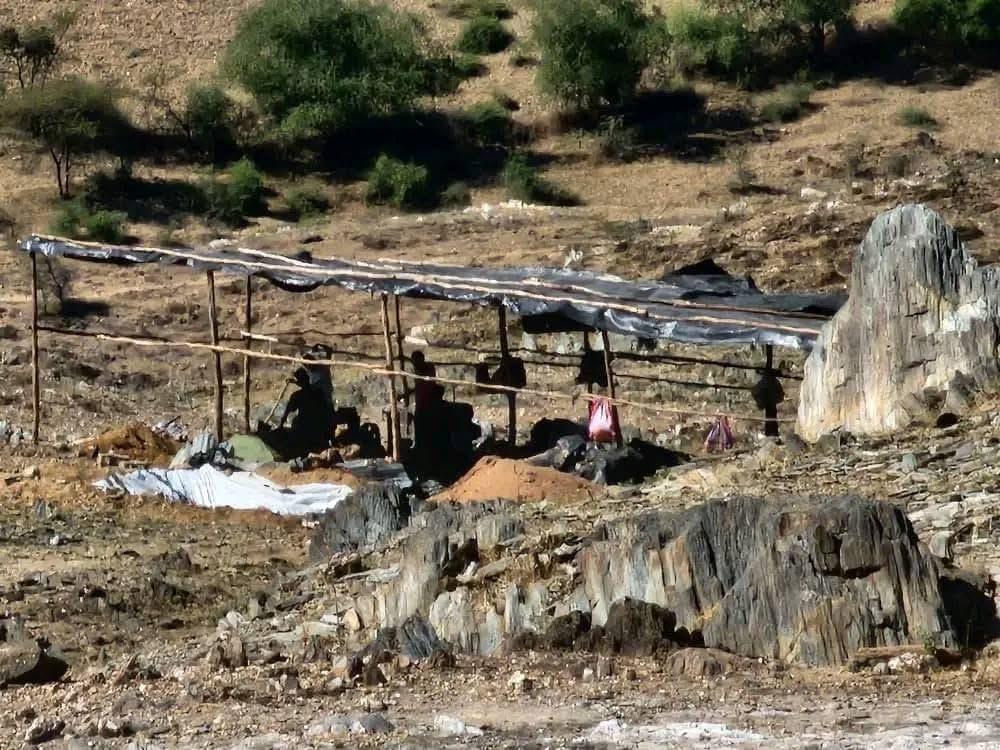When an excavator appeared at Tsion’s doorstep in the Tigray region of Ethiopia, the 37-year-old mother immediately understood why it came. Accompanying the machine was a group of foreigners, escorted by armed TDF members.
“They told me they needed the land for mining,” she said. “I refused, and they imprisoned me.” After a week of detention, Tsion was released. But upon returning home, she was devastated by what she saw.“
The land was almost gone. They had excavated it and transported all the soil elsewhere. Within a week, they had dug day and night. They did it because my land had gold. They took the soil, washed it in another location, and extracted the gold.
Tision
Tsion has never been the same since. Beyond losing her ancestral farmland and any gold it held, she has also suffered mentally and emotionally. Her experience reflects a broader tragedy unfolding across Tigray.
Land grabs and clashes are frequent at illegal mining sites across Tigray, where several dangerous confrontations have erupted over gold-rich areas.
These often break out when local residents resist attempts by Tigray TDF generals to seize land and hand it over to foreign mining operators. Disputes over gold profit-sharing are also a frequent trigger.
A particularly deadly clash occurred in August 2024 in Rahwa village. The area, known for its substantial gold reserves, has been heavily militarized and densely populated by illegal miners since the end of the conflict. Witnesses report that more than twenty people were killed in a violent altercation between local laborers and foreign operators. The conflict reportedly began when the locals demanded a share of the gold proceeds.
Media suppression has become another concerning trend linked to the illegal gold trade. In March 2025, this reporting team was detained and interrogated while reporting on the illicit gold market in Tigray. The team was forced to delete camera footage before being released.
In a separate incident in December 2024, unidentified assailants kidnapped three journalists from Tigray Television who were investigating illegal mining in the region. Their abducgtors released the reporters hours later.
A joint field survey conducted by several opposition political parties in Tigray also reveals widespread reprisals and killings of opposition party members and local activists who reported illegal mining activities.

Health Crisis & Environmental Collapse
The use of mercury and cyanide in illegal gold mining in Tigray has wrought environmental damage and serious health problems for residents. They include acute poisoning, respiratory diseases, cancers, and irreversible health damage, disproportionately impacting vulnerable populations such as children, pregnant women, and the elderly.
In an open letter addressed to Tedros Adhanom, Director General of the World Health Organization (WHO), Tadele Mengistu, who was serving as head of the Transport & Communication Bureau of Tigray, urgently highlighted the unregulated use of toxic chemicals in mining operations across Tigray and called for immediate WHO intervention.
Toxic contamination from illegal mining is rendering farmlands barren.
Tadele Mengistu – Head of the Transport & Communication Bureau of Tigray
“The unregulated use of toxic chemicals, including cyanide, mercury, and arsenic, in mining operations is causing widespread environmental and public health disasters,” Mengistu wrote in December 2024.
He warned that the contamination of rivers, agricultural lands, and ecosystems is threatening vital water sources, such as the Tekeze River, and rendering farmlands barren.
Mengistu also called for an international investigation into those responsible for the destruction, including the federal government and “foreign entities.”
In 2024, the Tigray administration issued an order to suspend all mining activities following reports of the use of hazardous chemicals, such as mercury and cyanide. However, this directive was not enforced.
According to the Addis Standard, a local media outlet, protests by residents of Asgede district against the use of harmful chemicals earlier this year resulted in the arrest of more than 20 residents by local security forces.
“If left unchecked, large areas of Tigray could become uninhabitable, displacing populations and causing irreversible damage to biodiversity. The contamination risks erasing Tigray’s cultural and environmental heritage, leaving a toxic legacy that could persist for generations”
Tadele Mengistu – Head of the Transport & Communication Bureau of Tigray
The side effects of mercury exposure have long been established by the scientific and international community. Extended exposure can cause mercury poisoning and lead to kidney damage. It can impair hearing, vision, and balance.
“We are already seeing the effects. There have been instances of cattle and goats dying, and children suffering from skin ailments in affected areas,” said Desta Hailu, an environmental geologist and lecturer at Mekelle University.
“If a parent is exposed to these chemicals, their children may suffer severe birth defects,” he added.
“These companies and individuals must be penalized, and those penalties should fund rehabilitation and compensation efforts. Above all, they should be banned from continuing operations.”
“However, because this rampant illegal gold mining is being run by government officials and security forces, we are unable to deliver justice to the people.” Judge in Shire town.
A judge in Shire town, who asked to remain anonymous for fear of repercussions, said his courtroom is seeing more and more cases arising from environmental hazards caused by illegal mining operators.
The cases involve “farmers, landowners, and residents whose livestock have died, whose soil has been degraded, and whose children’s skin has been affected” and who are suing the operators of the mining sites, the judge said.

Discrepancies in Export Figures Trace Ethiopia’s Smuggled Gold to the U.A.E.
Multiple studies have identified the United Arab Emirates (U.A.E.) as a major destination for Africa’s smuggled gold. In 2019, a Reuters investigation found that billions of dollars’ worth of gold was being smuggled out of Africa every year through the U.A.E., which served a gateway to markets in Europe, the United States and beyond.
A more recent report by SWISSAID, an NGO, found that between 2012 and 2022, some 2,569 metric tonnes of undeclared gold from Africa—then worth a staggering $115 billion—ended up in the U.A.E.
Under current gold prices, the same amount of gold would be worth $278 billion.
These gaps are not incidental; rather, they reflect a broader pattern, in which the U.A.E. functions as more than just a passive recipient of illicit gold from illegal gold sellers and traders. This role is also consistent with a wider strategic stance attributed to the U.A.E.: attracting billions in trade, cultivating deep regional influence, and leveraging that power to secure vital resources.
Ethiopia’s official ties with the U.A.E. also reflect this dynamic. Since taking office in 2018, Prime Minister Abiy Ahmed has relied heavily on Gulf capital to support his ambitious development agenda. Just months into his term, Dubai pledged $3 billion in aid and investment to back his economic and political reforms and to ease Ethiopia’s foreign currency shortages.
The U.A.E has financed numerous high-profile projects in Ethiopia, including the Unity Park in Addis Ababa and a stadium currently under construction, with a reported investment of $57 million.
 Several investigative reports have also uncovered the U.A.E.’s involvement in the Tigray War, alleging that it provided substantial military support to the Ethiopian government. This support reportedly included air bridges, weapons, drone supplies, and training for the Ethiopian Republican Guard.
Several investigative reports have also uncovered the U.A.E.’s involvement in the Tigray War, alleging that it provided substantial military support to the Ethiopian government. This support reportedly included air bridges, weapons, drone supplies, and training for the Ethiopian Republican Guard.
While support has been arriving from Dubai, Ethiopia’s gold has been flowing in the opposite direction toward the U.A.E.
The United Nations Commodity Trade Statistics Database (UN Comtrade), detailed imports and exports statistics reported by countries, shows that the majority of Ethiopia’s official gold exports in recent years have been destined for Dubai.
But this trade data also shows more than official exports. A comparison of gold exports reported by Ethiopia with gold imports declared by the U.A.E. reveals significant discrepancies.
Between 2021 and 2023, the National Bank of Ethiopia officially reported gold exports valued at $1.148 billion. However, Dubai reported importing $1.6397 billion worth of gold from Ethiopia during the same period, indicating an unaccounted $490 million in gold exports in 3 years.
Experts believe that Dubai’s import figures vastly undercount Ethiopian gold.
Marc Ummel, Head of the Raw Materials Unit at SWISSAID and co-author of SWISSAID’s study on undeclared African gold flow, notes that assessing gold smuggling from Ethiopia requires examining the export figures of neighboring countries. “Ethiopia is a landlocked country. Some of the gold smuggled from Ethiopia typically exits through Eritrea and Somalia before reaching U.A.E.,” he explained.
“In 2023, the U.A.E. declared it imported 5 tonnes of gold from Somalia. While Somalia does have some small-scale mining, the volume of exports is suspiciously high.
“Looking at the region as a whole, it seems clear that a substantial amount of gold entering the UAE from East Africa is routed through neighboring countries to obscure its Ethiopian origins,” Ummel said.
In 2023 alone, the U.A.E. reported importing 37.9 tonnes of gold from Ethiopia, Kenya, Somalia, Sudan and Eritrea, valued at $2.28 billion.

Tigray’s Uncertain Future
“Amid internal divisions within Tigray’s leadership, TPLF, the region’s military, has emerged as the dominant political force. A high-ranking TDF general has now been appointed as the new interim president of the Tigray region, replacing Getachew.
Tensions are once again mounting between the federal government and Tigray’s regional authorities. High-stakes rhetoric has returned, threatening the fragile post-Tigray war transition.
A familiar source of friction, illegal gold mining, has also re-emerged as a key point of contention, with major public announcements implicating military generals in illicit mining activities. In mid-May 2025, foreign nationals were barred from entering Tigray.
As the situation escalates, many fear the region could once again descend into conflict, prolonging the suffering of the people of Tigray.
Reporting for this story was supported by a grant from Journalists for Transparency. **Originally published on 100 Reporters (full article here)**






